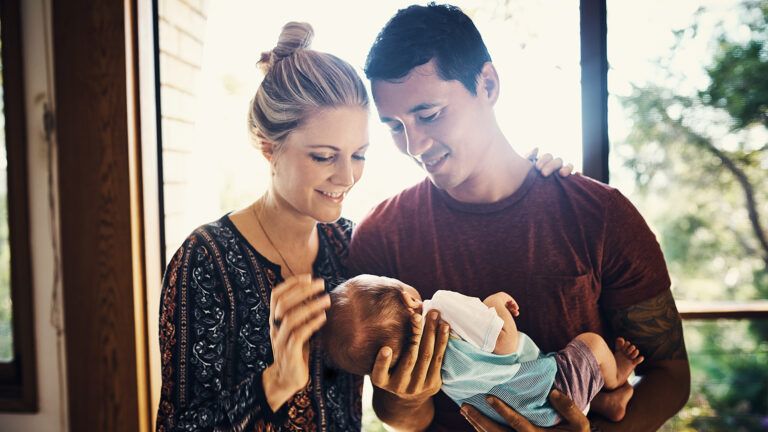Like most mothers, I’ve watched my share of hospital dramas on TV. A child rolled into the ER on a gurney. The frantic staff. The life-and-death tension. What if that were my Andrew? I’d wonder. I’d never been super religious, but I’d always felt I had a deal with God: I’d never ask for lots of money or a big house, and I’d always thank him for what he did give me. In return, all I wanted was for him to keep things on an even keel. Just don’t give me more than I can handle, I’d pray.
Then one terrible night, the six-year-old on the gurney was my little boy. He was rushed to Hasbro Children’s Hospital in Providence, Rhode Island, fighting meningococcemia, a deadly form of meningitis. And all at once it felt as if my deal with God were off the table.
Andrew had been such a normal kid: frisky, athletic, the type of boy who wolfed down his lunch, itching to get back outside and play. The evening he got sick, he’d been running around outside with his sister and cousins. Later, we went for ice cream. That’s when it happened. “Mom, my legs hurt,” he said. “I feel so tired.” I felt his forehead. It was burning up. By the time we got home, he was shivering, with a 102-degree fever.
“Probably the flu,” I told Scott, my husband, and put Andrew to bed. I hoped it was just a 24-hour bug. The next day was July 4, and we had a big family picnic planned. But that night he threw up several times. By morning his face had taken on a grayish pallor. He was limp and didn’t feel like doing anything. I called our family doctor. He recommended we take him to the hospital for tests.
By the time we arrived at the hospital, red, pinprick-like dots had spread across his body. Hemorrhages. The ER nurse had seen these symptoms before.
“We’re going to take him to the trauma room,” the nurse said. Within minutes, the pinpricks had grown to purple splotches on his stomach, thighs and neck. The chief physician pulled us aside while the ER team pumped Andrew full of antibiotics. “We’re pretty sure your son has meningitis,” he said. “The antibiotics have probably killed the bacteria by now.”
“So he’s going to be okay?” Scott asked.
The doctor shook his head. “We got the bacteria, but not before it sent millions of toxins into Andrew’s system. He’s going to get sicker probably.” A chill went through me. Scott and I stared at Andrew. Our son was changing before our eyes. The emergency staff couldn’t stop the hemorrhaging. Bacterial meningitis is one of the most aggressive illnesses known to man. Andrew’s whole body grew puffy. Much of his skin turned almost blackish, as if from severe burns. “Scott,” I said, trying to hold back tears, “he doesn’t even look like our son anymore.”
We turned to the doctor for some positive sign. He didn’t give one. Only later would we learn that the mortality rate for a case this severe approached 80 percent. Gently, the doctor said, “You need to prepare yourselves. I can’t predict whether or not Andrew will survive.”
Andrew was moved to the ICU. We stayed up that night watching him. He was hooked to so many tubes, he looked more like a lab rat than our boy. You’ve got to fight, Andrew, I thought. You’ve got to fight hard. I closed my eyes. Lord, I prayed, I don’t know how much more I can take. I don’t know if I can handle this. I thought we had a deal.
Yet Andrew did not improve. Each day brought a new crisis: Andrew’s kidneys failed. He needed to be put on a ventilator. Finally, the doctors induced a coma to relieve his pain. Andrew’s hands turned cold, then curled into frozen claws. The hemorrhaging had virtually cut off circulation to his extremities. His toes and legs were literally dying. A week after Andrew entered the hospital, one of his doctors asked to talk to us. She led us to a consultation room down the hall from Andrew’s room. “Andrew’s blood vessels are blocked to the point where they may be ruined,” she said. “Once that happens, it’s hard to reestablish circulation. There’s a good chance we’re going to have to amputate.”
I held it together till the doctor left. I expected to break down. Instead, I flushed with anger. God wasn’t keeping his part of the bargain. My boy might lose his hands and legs. He might die. Why are you doing this to a child? I asked, bitterly. Why are you doing this to our family?
Nothing changed, no matter how angry I got. Andrew’s second week in the hospital, with his legs an awful purple-black, the doctors ordered a bone scan. Three hours later, the results came in: “There’s nothing. No circulation at all below the knees,” the orthopedist said. “We have to amputate his legs. If we don’t, it could jeopardize his life.” I couldn’t speak. I tried to picture Andrew—my active little boy—in a wheelchair. A wheelchair!
Following the operation, Andrew remained in a coma for days. All I could do was sit there and watch him, my heart filled with sorrow and bitterness. But that burden was nothing compared to the time I knew was coming: when Andrew would awaken and we’d have to tell him about his legs. If he awakened.
He did. He finally turned the corner. Scott and I walked into his hospital room. Andrew was watching TV. “Honey,” I said, “we really need to talk about what happened to you.” Scott and I stood on either side of his bed. “You were very sick. You’re getting better, but your legs didn’t get better so the doctors had to take them off. If they didn’t, hon, you wouldn’t have gotten better. But we’re going to get you new legs.”
Andrew started to cry. “I want my old legs back,” he repeated again and again, between sobs.
I wanted to cry too. But I couldn’t in front of him. All I could do was hold Andrew and say, “You can’t have them. They won’t work anymore.” And wonder again, Lord, how could you do this to a child? I’m at my breaking point. Can’t you see?
I was still fighting to keep from crying when Andrew asked a new question: “Mom, will I ever be able to walk again?”
“Oh, yeah,” I told him. “I’ve heard of kids who’ve done all kinds of things.”
“Will I be able to run?”
“It’s going to take some work, but I don’t see why not.”
“How will I ride my bike?
“We’ll figure it out,” I said.
Andrew fell asleep. But I couldn’t. Lord, won’t you finally help us? I asked.
At last, in early September, Andrew was well enough to come home. I was relieved and also worried sick. How would Andrew hold up emotionally when he saw how different life without legs would be?
It was tough. Andrew had been fitted with prosthetics right before he came home. It’s one thing to have one artificial leg. At least you can balance on the other, feel where you’re going. But two legs! Rehab was incredibly hard—and slow. The doctors warned that Andrew probably wouldn’t take his first unassisted steps till November—if then. I could see the frustration in his face when kids would zip past our house on their bicycles. As for myself, I was just worn out. I used to pray in anger at God. Now I didn’t even have the energy to do that. I wasn’t even sure where God was anymore. I felt abandoned, and it was worse, far worse than feeling simply angry. This was a cold, dark space in my heart, as if my faith had been taken away like my son’s legs.
Then one night at the dinner table, Andrew said out of nowhere, “I saw God, Mommy. I was sleeping at the hospital. He put his arms out and I thought he was going to give me a hug. But instead he just touched me on the shoulder.”
“Did he say anything?” I asked.
“No, he was just…there.”
A chill ran down my spine. He was just there. What did that mean? I looked at Andrew, wolfing down his dinner. For months all I’d seen was a handicapped child, a damaged child, fighting as hard as he could, failing more often than succeeding in his rehab. Falling down, unable to master his new legs. Yet, unlike me, never turning bitter, never giving up. “I’m going to walk, and I’m going to ride my bike,” he’d insist. “You just watch.”
Andrew has come through this better than I have. He was moving on. But I was stuck in my bitterness and sense of spiritual betrayal. He was just there. Had God been there all along for me too, and I was too angry to see? Was he there for me now? Lord, thank you for being with Andrew. Be with me now, too.
Andrew had been in therapy for a while, and three weeks before he’d managed a few cautious steps—but only with the support of parallel bars. Then one day in October, the family was sitting in the living room. Suddenly, with no warning, Andrew struggled to his feet. Without a word he walked slowly, awkwardly, across the living room on his own. And then back again. “Did you see that?” Scott asked. I was dumbstruck. The doctors had predicted he wouldn’t walk before Christmas. My eyes filled with tears. But in my mind’s eye, clear and unwavering, I saw my boy walking again with a strong hand on his shoulder—just there.
Andrew is 15 now. He rides his bike, he plays basketball, he’s even on a hockey team. Sometimes when I’m at one of his games, I’ll see him fall and I’ll think, Andrew, you shouldn’t be doing this. It’s too much. But then I catch myself. And I hear a voice whisper, Don’t be afraid. I’m here. I can handle that.





